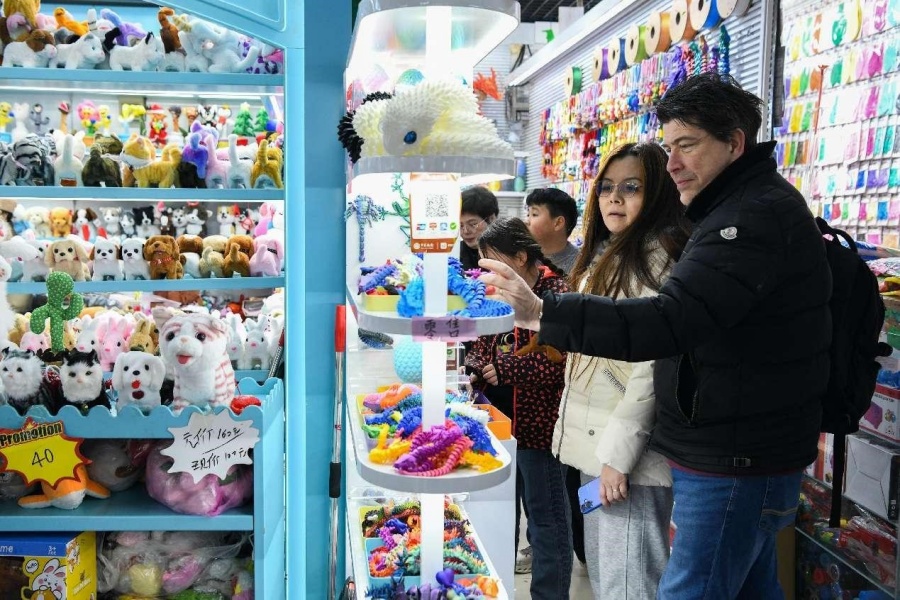"World's supermarket" Yiwu launches new trade reforms

A foreign merchant buys winter sports equipment at Yiwu International Trade Market in Yiwu, east China's Zhejiang province. [People's Daily Online/Zhang Yongtao]
Yiwu International Trade Market - the globe's premier hub for small commodities trade in east China's Zhejiang province - hummed with energy as buyers and sellers converged.
Zhang Shidan, founder of Yiwu Jinshang Daily Commodities Trading Company, was processing a scaled-up order for children's straw cups from her Middle Eastern client—a follow-up order triggered by the client's exceptional sell-through rates in their regional markets.
"To maintain our edge in this fast-paced industry, we roll out 1-2 proprietary designs monthly and release 1,000+ new SKUs (Stock Keeping Unit) annually," Zhang emphasized. "We also prioritize hyper-localized customization to align with distinct regional preferences."
Chris, a London-based procurement specialist with a decade of sourcing expertise in Yiwu, expressed enthusiasm for the city's ever-evolving product landscape. "I purchase over 100 shipping containers annually - spanning jewelry, tools, and beyond," he noted. "Each visit unveils fresh innovations. This time, I'm gearing up for a substantial procurement campaign."

A foreign merchant shops at Yiwu International Trade Market in Yiwu, east China's Zhejiang province. [People's Daily Online/Hu Xiaofei]
Dubbed the "world's supermarket," Yiwu boasts 2.1 million product categories that sustain the operations of 2.1+ million SMEs and micro-enterprises, while maintaining trade partnerships across 230+ countries and regions.
Annually, some 600,000 global buyers flock to Yiwu, supported by 28,000 permanently stationed international traders. The city's 650,000+ digital-first e-commerce enterprises amplify its cross-border influence through online channels.
In late 2024, China's State Council greenlit a comprehensive reform blueprint to propel Yiwu's international trade modernization. The plan outlines 97 targeted initiatives across five pillars: streamlined procurement frameworks for agile cross-border trade; deeper integration of domestic and global supply chains; next-generation logistics infrastructure; enhanced regulatory ecosystems; a world-class business climate.
To advance innovative import development, the plan proposed a positive-list management mechanism for select imported consumer goods, simplifying customs procedures while maintaining security protocols.
"Yiwu holds the inherent advantage in broadening import channels by capitalizing on its robust logistics and digital infrastructure cultivated through decades of export expertise," remarked Zhang Yongjun, secretary-general and researcher at the China Center for International Economic Exchanges.
"With tens of thousands of global buyers visiting annually, these professionals can act as bridges to introduce premium and niche products from their home markets into China," Zhang added.
To enhance market procurement mechanisms, the plan established a trade consolidator system, integrated into formal trade frameworks. It strengthened real-time market oversight, cargo consolidation protocols, and streamlined customs documentation.
Leveraging Yiwu's digital trade service platform, the entire supply chain - covering transactions, logistics, payments, and financing—has undergone end-to-end digitalization.
For secure global service networks, the initiative incentivizes businesses to develop proprietary international digital platforms incorporating functions like cross-border marketing, last-mile delivery, and post-sale services. Concurrently, it prioritizes optimizing logistics through expanded direct shipping routes, centralized cargo resources, and upgraded "door-to-door" and "warehouse-to-warehouse" freight solutions.

Foreign merchants learn about 3D-printed toys at Yiwu International Trade Market in Yiwu, east China's Zhejiang province. [People's Daily Online/Shi Kuanbing]
In today's global economy, supply chain security and stability have emerged as pivotal challenges. Lu Jing, head of the Department of International Trade and Economics at Zhejiang University's School of Economics, highlights that Yiwu's reforms present innovative strategies for optimizing global supply chain.
Lu emphasized that China is advancing a more efficient logistics network for small commodities, utilizing China-Europe freight trains and multimodal transport solutions integrating air, sea, and rail to lower trade costs and bolster the supply chain resilience.
Since the approval of its comprehensive reform plan, Yiwu has pioneered transformative initiatives with measurable outcomes. Toy import certification now requires only five days, down from twenty, while the inaugural "Yiwu Selection" store - a platform for Chinese brands to enter global markets - generating 120 million yuan ($16.56 million) in orders within five hours of opening. Additionally, Yiwu launched an e-commerce industrial park processing over 10 million parcels daily, and its airport was upgraded to a visa-free transit hub.
Zhang Jianping, deputy director of the academic committee of the Chinese Academy of International Trade and Economic Cooperation, described Yiwu as a microcosm of China's international trade, reflecting both the prowess of its manufacturing sector and the dynamism of its domestic market.
From Yiwu, countless small commodities reach global markets, while high-quality international goods enter China and circulate nationwide," Zhang noted. He added that the city's innovative trade model not only fuels local economic growth but also provides a blueprint for trade development across China.
























